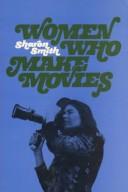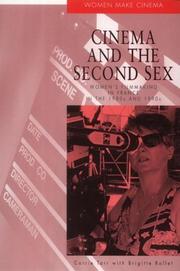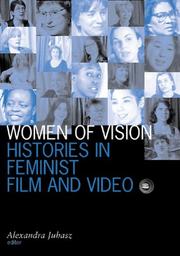| Listing 1 - 10 of 153 | << page >> |
Sort by
|
Book
ISBN: 3030709949 3030709930 Year: 2021 Publisher: Cham, Switzerland : Palgrave Macmillan,
Abstract | Keywords | Export | Availability | Bookmark
 Loading...
Loading...Choose an application
- Reference Manager
- EndNote
- RefWorks (Direct export to RefWorks)

ISBN: 0911974091 Year: 1975 Publisher: New York (N.Y.) Hopkinson and Blake
Abstract | Keywords | Export | Availability | Bookmark
 Loading...
Loading...Choose an application
- Reference Manager
- EndNote
- RefWorks (Direct export to RefWorks)

ISBN: 0826447422 Year: 2001 Publisher: New York, NY : Continuum,
Abstract | Keywords | Export | Availability | Bookmark
 Loading...
Loading...Choose an application
- Reference Manager
- EndNote
- RefWorks (Direct export to RefWorks)
Motion pictures --- Women motion picture producers and directors --- History. --- Biography.
Book
ISBN: 9781474466950 Year: 2020 Publisher: Edinburgh : Edinburgh University Press,
Abstract | Keywords | Export | Availability | Bookmark
 Loading...
Loading...Choose an application
- Reference Manager
- EndNote
- RefWorks (Direct export to RefWorks)
Since the turn of the millennium, a growing number of female filmmakers have appropriated the aesthetics of horror for their films. In this book, Patricia Pisters investigates contemporary women directors such as Ngozi Onwurah, Claire Denis, Lucile Hadžihalilović and Ana Lily Amirpour, who put ‘a poetics of horror’ to new use in their work, expanding the range of gendered and racialized perspectives in the horror genre..Exploring themes such as rage, trauma, sexuality, family ties and politics, New Blood in Contemporary Cinema takes on avenging women, bloody vampires, lustful witches, scary mothers, terrifying offspring and female Frankensteins. By following a red trail of blood, the book illuminates a new generation of women directors who have enlarged the general scope and stretched the emotional spectrum of the genre..Discusses how contemporary women directors have appropriated horror aesthetics, enlarging its generic scope and expanding its emotional spectrum. Revisits themes and concerns of the horror genre, from the perspective of women directors. Includes case studies of important female directed films, including Raw, Evolution and Atlantics. Revisits feminist themes such as female agency, gender and race relations and affect by returning to the work of feminist directors of the 1970s and 1980s (not necessarily considered as generic horror films), in comparison to contemporary women directors. Includes women of colour as well as white women directors, thus acknowledges both differences of the specific ethnic and social political contexts and shared concerns.
Book

ISBN: 9781636810607 Year: 2023 Publisher: New York : DelMonico Books,
Abstract | Keywords | Export | Availability | Bookmark
 Loading...
Loading...Choose an application
- Reference Manager
- EndNote
- RefWorks (Direct export to RefWorks)
"A visual tribute to Agnès Varda's three lives as a photographer, filmmaker and artist, with previously unseen archival materials, texts and personal reflections from Jane Birkin, Martin Scorsese, JR, and more. French filmmaker Agnès Varda was a trailblazer who broke new artistic and cinematic ground for nearly seven decades. Although closely associated with the French New Wave, Varda established her groundbreaking visual style in her 1955 debut film La Pointe Courte, well before other milestones such as François Truffaut's The !àà Blows and Jean-Luc Godard's Breathless. Varda impacted cinema from her first feature film through her final works, with an expansive oeuvre that includes Cleo from # to à (1962), Vagabond (1985) and the Academy Award-nominated Faces Places (2017). Agnès Varda: Director's Inspiration presents the first English-language visual showcase for Varda's inspirations, art and personal life, incorporating original materials from her personal archive on Rue daguerre. The book covers Varda's "three lives"-as photographer, filmmaker and visual artist-and features a previously unpublished interview Varda gave to the Academy of Motion Picture Arts and Sciences on the eve of receiving her Honorary Oscar in 2017. Essays by author Sasha Archibald and film critic Peter Debruge examine facets of Varda's creative lives, and personal reflections by friends and colleagues illustrate what it was like to collaborate with and be inspired by Varda. Agnès Varda (1928-2019) was a French filmmaker, photographer and visual artist, sometimes called the grandmother of the French New Wave. In 2018, her film with the French photographer and muralist known as JR, Faces Places, received an Academy Award nomination for Best Documentary Feature, and that same year she received an honorary Academy Award for lifetime achievement"--
Book
ISBN: 9783631807958 Year: 2021 Publisher: Berlin : Peter Lang,
Abstract | Keywords | Export | Availability | Bookmark
 Loading...
Loading...Choose an application
- Reference Manager
- EndNote
- RefWorks (Direct export to RefWorks)
Este libro recoge una serie de entrevistas y encuentros con mujeres cineastas del siglo XXI cuyas voces están redibujando la cinematografía nacional, a menudo, desde los márgenes de la industria. La introducción perfila el contexto de esta emergencia y las principales líneas discursivas, subrayando el surgimiento de redes más o menos formales que permiten pensarse de manera colectiva. Las entrevistas, realizadas por especialistas en cine español y acompañadas de retratos ex profeso, exploran sus trayectorias laborales y vitales, sus aportaciones artísticas y las particularidades del quehacer fílmico en clave de género. Las experiencias de creadoras diversas —cuya obra se adscribe a la ficción, el documental y la animación— ofrecen una mirada poliédrica y descentrada al cine contemporáneo.
Motion pictures --- Women motion picture producers and directors --- History
Book
ISBN: 9781784537111 Year: 2017 Publisher: London I.B. Tauris
Abstract | Keywords | Export | Availability | Bookmark
 Loading...
Loading...Choose an application
- Reference Manager
- EndNote
- RefWorks (Direct export to RefWorks)

ISBN: 9780816652846 9780816633722 Year: 2001 Publisher: Minneapolis University of Minnesota Press
Abstract | Keywords | Export | Availability | Bookmark
 Loading...
Loading...Choose an application
- Reference Manager
- EndNote
- RefWorks (Direct export to RefWorks)
Alexandra Juhasz asked twenty-one women to tell their stories—women whose names make up a who is (and who will be) who of independent and experimental film and video. What emerged in the resulting conversations is a compelling (and previously underdocumented) history of feminism and feminist film and video, from its origins in the fifties and sixties to its apex in the seventies, to today. Women of Vision is a companion piece to Juhasz’s 1998 documentary of the same name. The book presents the complete interviews, allowing readers to hear directly the voices of these articulate, passionate women in an interactive remembering of feminist media history. Juhasz’s introduction provides a historical, theoretical, and aesthetic context for the interviews. These subjects have all shaped late twentieth-century film and video in fundamental ways, either as artists, producers, distributors, critics, or scholars, and they all believe that media are the most powerful tools for effecting change. Yet they are a very diverse group, with widely varying personal and professional backgrounds. By presenting their interviews together, Juhasz shows the differences among those involved in feminist media, but also the connections among them, and the way in which the field has been enriched by their sharing of knowledge and power. In the end, Juhasz not only records these women’s careers, she broadens our understanding of feminism and shows how feminist history and documentary are made.
Book
ISBN: 1419755528 9781419755521 Year: 2022 Publisher: New York Abrams
Abstract | Keywords | Export | Availability | Bookmark
 Loading...
Loading...Choose an application
- Reference Manager
- EndNote
- RefWorks (Direct export to RefWorks)
"An illustrated critical survey of Academy Award–winning writer and director Sofia Coppola’s career, covering everything from her groundbreaking music videos through her latest films. In the two decades since her first feature film was released, Sofia Coppola has created a tonally diverse, meticulously crafted, and unapologetically hyperfeminine aesthetic across a wide range of multimedia work. Her films explore untenable relationships and the euphoria and heartbreak these entail, and Coppola develops these themes deftly and with discernment across her movies and music videos. From The Virgin Suicides and Marie Antoinette to Lost in Translation and The Beguiled, Coppola’s award-nominated filmography is also unique in how its consistent visual aesthetic is informed by and in conversation with contemporary fine art and photography. This publication offers a rich and intimate look at the overarching stylistic and thematic components of Coppola's work. In addition to critical essays about Coppola's filmography, the book will include interviews with some of her closest collaborators, including musician Jean-Benoît Dunckel and costume designer Nancy Steiner, along with a foreword by Italian filmmaker Alice Rohrwacher. It engages with her creative output while celebrating her talent as an imagemaker and storyteller. Along the way, readers meet again a cast of characters mired in the ennui of missed connections: loneliness, frustrated creativity, rebellious adolescence, and the double-edged knife of celebrity, all captured by the emotional, intimate power of the female gaze."--
Book

ISBN: 9782955142998 Year: 2023 Publisher: [Asnières-sur-Seine] : Jaguarundi éditions,
Abstract | Keywords | Export | Availability | Bookmark
 Loading...
Loading...Choose an application
- Reference Manager
- EndNote
- RefWorks (Direct export to RefWorks)
Films fantastique, d'horreur ou de science-fiction : le cinéma de genre a longtemps été chasse-gardée des réalisateurs masculins. Mais aujourd'hui le genre se conjugue aussi au féminin. Rencontres avec des réalisatrices françaises de tous âges et d'horizons différents, qui bousculent les codes.
| Listing 1 - 10 of 153 | << page >> |
Sort by
|

 Search
Search Feedback
Feedback About UniCat
About UniCat  Help
Help News
News